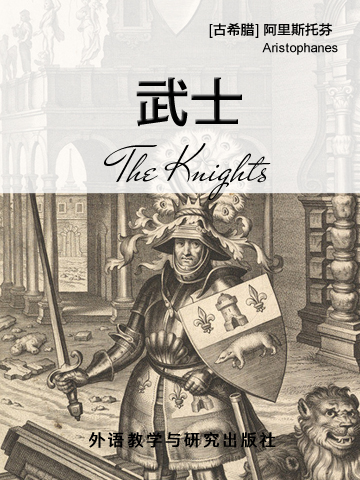(SCENE:-The Orchestra represents the Pnyx at Athens; in the back-ground is the house of DEMOS.)
DEMOSTHENES
Oh! alas! alas! alas! Oh! woe! oh! woe! Miserable Paphlagonian! may the gods destroy both him and his cursed advice! Since that evil day when this new slave entered the house he has never ceased belabouring us with blows.
NICIAS
May the plague seize him, the arch-fiend-him and his lying tales!
DEMOSTHENES
Hah! my poor fellow, what is your condition?
NICIAS
Very wretched, just like your own.
DEMOSTHENES
Then come, let us sing a duet of groans in the style of Olympus.
DEMOSTHENES AND NICIAS
Boo, hoo! boo, hoo! boo, hoo! boo, hoo! boo, hoo! boo, hoo!!
DEMOSTHENES
Bah! it's lost labour to weep! Enough of groaning! Let us consider now to save our pelts.
NICIAS
But how to do it! Can you suggest anything?
DEMOSTHENES
No, you begin. I cede you the honour.
NICIAS
By Apollo! no, not I. Come, have courage! Speak, and then I will say what I think.
DEMOSTHENES (in tragic style)
"Ah! would you but tell me what I should tell you!
NICIAS
I dare not. How could I express my thoughts with the pomp of Euripides?
DEMOSTHENES
Oh! please spare me! Do not pelt me with those vegetables, but find some way of leaving our master.
NICIAS
Well, then! Say "Let-us-bolt," like this, in one breath.
DEMOSTHENES
I follow you-'Let-us-bolt."
《武士》主要描述的是公元前5世纪时希腊的政治、社会生活状况。里面的任务克里昂是个十足的反面人物,然而,这并不是简单地描述而已。这部作品还是一个寓言,象征着当时的某些人。
The Knights was the fourth play written by Aristophanes, the master of an ancient form of drama known as Old Comedy. The play is a satire on the social and political life of classical Athens during the Peloponnesian War and in this respect it is typical of all the dramatist's early plays. It is unique however in the relatively small number of its characters and this was due to its scurrilous preoccupation with one man, the pro-war populist Cleon. Cleon had prosecuted Aristophanes for slandering the poliswith an earlier play, The Babylonians (426 BC), for which the young dramatist had promised revenge in The Acharnians (425 BC), and it was in The Knights (424 BC) that his revenge was exacted. The play relies heavily on allegory and it has been condemned by one modern scholar as 'an embarrassing failure'.[3] However, The Knights won first prize at the Lenaia festival when it was produced in 424 BC.
- KNIGHTS
- 书评 写书评
- 笔记
-
书评加载中...























 京公网安备 11010802032529号
京公网安备 11010802032529号
笔记加载中...